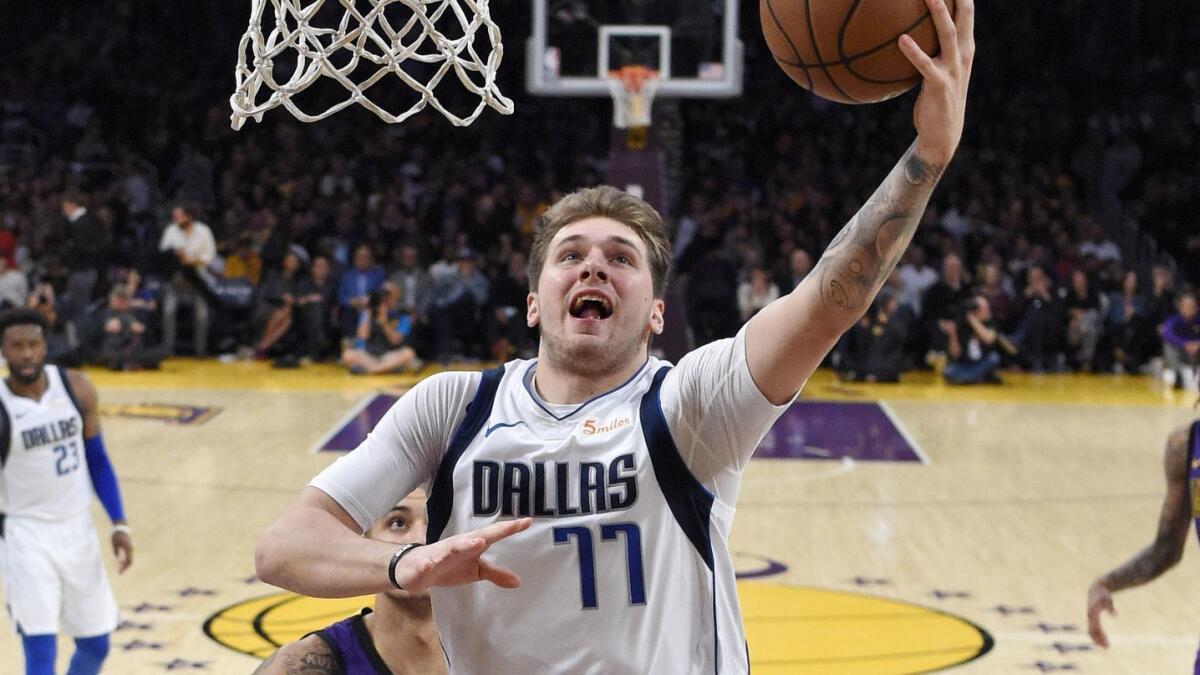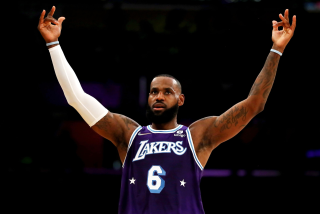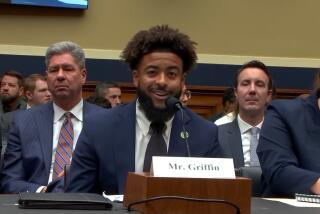Column: Daishen Nix’s journey is the latest example of amateur hour at the NCAA
- Share via
You don’t have to spend much time Googling Luka Doncic’s name before discovering that the Dallas Mavericks star has been playing against adults since he was 13. Not adults at the YMCA mind you. No, he was a pro, as were the players he faced. That experience was viewed by American audiences as a positive before he was taken third in the 2018 NBA draft.
Just as the story of Dirk Nowitzki, who started playing professionally at 15, was.
Just as the story of Peja Stojakovic, also 15 when he turned pro, was.
Toni Kukoc and Arvydas Sabonis, both of them 17 when they turned pro, too.

I could go on and on because basketball-reference.com is peppered with examples of international players being celebrated for having apprenticed abroad professionally as young teens before entering the NBA.
Yet when it comes to our homegrown players, we think and talk about it differently. And that’s where we arrive at the story of Daishen Nix, the nation’s top high school point guard who was UCLA-bound until last week. “I think it was the right thing for me because it was a family thing and a myself thing,” Nix told The Times’ Dan Woike.
A “myself thing” is certain to trigger the anti-none-and-done crowd, who already believe the one-and-dones are ruining college basketball. They will continue to label college athletes who want to be paid for their labor as ingrates, as if college tuition is fair compensation for the billions their skills generate.
When producers of “The Last Dance” announced a new date for the series to debut, they had finished only three of the 10 episodes. The final episode still is not complete.
He who controls the narrative controls the reality.
The NCAA has been able to treat college basketball players as indentured servants for as long as it has because it has cleverly convinced fans — and perhaps the NBA — it is safeguarding archaic and false notions of amateurism. It’s an NBA rule that keeps players from jumping straight from high school to its league.
The NCAA long ago became the vulture the athletes needed protection from. Any protest from the NCAA that it is trying to fix a broken system ignores this basic truth: The system isn’t broken, it is doing exactly what it was designed to do.
Last week the NCAA Board of Governors threw its support behind rule changes that would allow student athletes to receive compensation for third-party endorsements. However, that decision isn’t about helping kids. It’s about self-preservation.
It’s about keeping top high school prospects such as Nix and Jalen Green and Isaiah Todd away from the clutches of the G League even though the European version of Green turned pro decades ago. When Ricky Rubio was taken fifth in the 2009 NBA draft, analysts were impressed with how well he played against the United States in the Olympics when he was 17 and marveled that he turned pro at 14. High school players such as Green and Todd raised eyebrows by choosing to turn pro out of high school only because the NCAA long ago talked the public into believing college is the only viable route to the NBA.
Something that was never true to begin with.
In 2008, Brandon Jennings turned pro in Italy rather than play a year in college. A system that forces Americans to leave the country just to make a living at their craft is an affront. The notion you can join the military directly out of high school but that you need a year of college before you can play professional basketball is a travesty. Thinking no one would notice that these revenue-producing sports dominated by black athletes are held to a different standard than those that are not is an insult.
Baseball and tennis players are free to turn pro right out of high school. But basketball? No, that’s always been treated differently. The money generated from the game was too great to just sit back and let the free market decide. The G League isn’t poaching talent from the NCAA because the talent never belonged to it in the first place.
It’s beautiful to see these empowered young men embrace that. What’s happening now isn’t a trend or a revolution. It’s not even a middle finger to the NCAA, although it deserves it. It’s good old-fashioned American capitalism. And the kids who decide to skip college and go pro? They’re not controversial, they’re just patriots exercising their rights.
More to Read
Go beyond the scoreboard
Get the latest on L.A.'s teams in the daily Sports Report newsletter.
You may occasionally receive promotional content from the Los Angeles Times.











